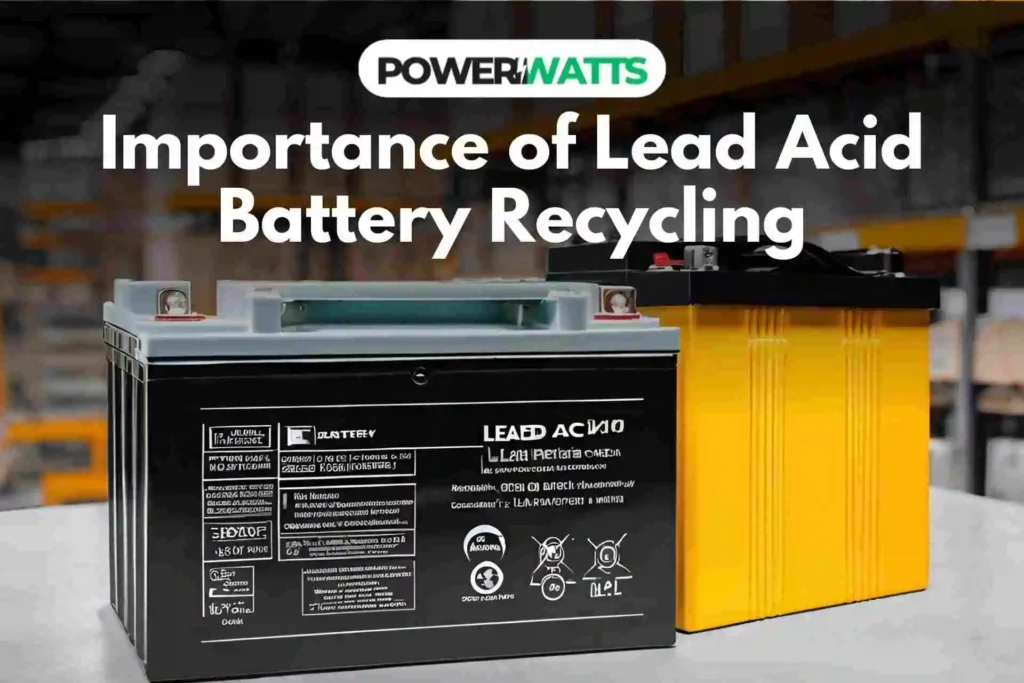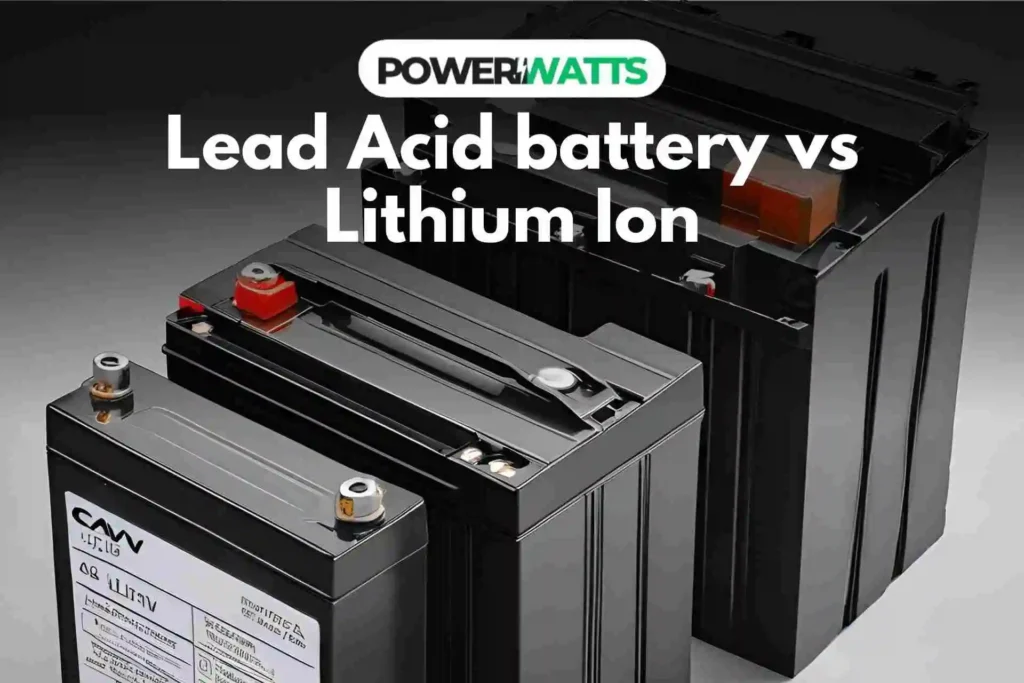Energy storage is essential in today’s fast-paced environment. No matter your needs—homeowners seeking solar power, electric car enthusiasts, or business owners wanting dependable backup power—battery technology may affect efficiency and cost. lead acid battery vs lithium ion batteries are popular. Which one is appropriate for you?
You’re not alone if you’re annoyed by your battery’s short lifetime or extended charging periods that disturb your routine. Many people wonder that Why does the battery die so quickly? or How can maximize their energy storage without breaking the bank. So, we will talk about the comparison between these two lead acid battery vs lithium ion batteries so you can make an educated selection that matches your requirements.
Now, we will compare lead acid battery vs lithium ion batteries. After this article, I am sure you can solve all battery issues.
Lithium-ion batteries:
Lithium-ion batteries have grown in popularity. However, the battery has high energy density, efficiency, and lifetime making lithium-ion batteries ideal for portable gadgets and electric vehicles.
Pros of Lithium-ion Battery
- Lithium-ion batteries have a better energy density and result in more capacity and runtime.
- Lithium-ion batteries are lightweight and tiny. And it is portable.
- Their self-discharge is lower, thus they hold their charge longer while not in use.
- Lithium-ion batteries charge quicker than lead-acid batteries.
- Lithium-ion batteries need no care, unlike lead-acid batteries.
Cons of Lithium-ion Battery
- Lithium-ion batteries cost more than others.
- Rare lithium-ion batteries may thermally run away and need suitable handling and protective circuits.
- Lithium-ion batteries decline with time even when not in use.
Lead Acid Batteries:
Lead acid batteries are among the earliest rechargeable batteries. They have lead dioxide (PbO2) positive and sponge lead (Pb) negative plates and a sulfuric acid (H2SO4) electrolyte. However, the cheap cost and dependability of these batteries make them popular in automobile and backup power systems.
Pros of Lead Acid Battery
- Lead-acid batteries are popular for many applications due to their low cost.
- Lead Acid can survive tough environments and last a long time.
- So, lead acid batteries come in many sizes and capacities.
- These batteries are extremely recyclable and make them eco-friendly.
Cons of Lead Acid Battery
- Lead acid batteries might restrict some uses due to their weight and size.
- They have less energy density than lithium-ion batteries, reducing capacity and runtime.
- Lead acid batteries need electrolyte level monitoring and equalization charging.
Which is Best: Lead Acid Battery vs Lithium-Ion Battery
Comparison between lead acid battery vs lithium ion batteries is essential. However, by studying these factors you may determine which battery type is fit for you.
Energy Density
- Lead acid batteries typically offer 30-50 Wh/kg energy density. Lead acid batteries store less energy than lithium-ion batteries, hence they take up more space and weigh more. Thus, lead acid batteries may not be suitable for small, lightweight energy solutions.
- Lithium-ion batteries have 150-200 Wh/kg energy density. Lithium-ion batteries are ideal for electric cars, cellphones, and computers due to their increased energy density.
Battery Cycle
- Lead acid batteries have a cycle life of 300 to 500, especially after significant discharges. So, Regular deep cycling may cause sulfation which lowers battery capacity and longevity. Therefore, users must carefully monitor discharge levels for best performance and lifetime.
- lithium-ion batteries may last 2,000 to 5,000 cycles or more. Thus, lithium-ion batteries are cheaper per cycle for applications like renewable energy storage systems that need frequent cycling.
Depth of Discharge
- Lead Acid Batteries: A 50% DoD is suggested for lead acid batteries. Users should only drain the battery to half its capacity to extend its longevity. Lead acid batteries that are regularly discharged over this level perform poorly and last less.
- In contrast, lithium-ion batteries may safely discharge 80-100% of their capacity without harm. Lithium-ion batteries are more efficient for energy-intensive applications because of their greater DoD.
Charging Time
- Lead Acid Batteries: Depending on battery size and charger, lead acid batteries might take 8–12 hours to charge. The long charging period might be troublesome for applications that need energy quickly.
- This is where lithium-ion batteries shine since they can be charged in 1 to 3 hours. However, this quick charging makes lithium-ion batteries ideal for electric cars and consumer gadgets that need to minimize downtime.
Performance at Temperature
- Lead acid batteries function poorly. Their performance and dependability might suffer in cold weather due to lower capacity. High temperatures also promote lead acid battery breakdown and limit the lifetime.
- Lithium-Ion Batteries: Lithium-ion batteries operate better across more temperatures. They work in both hot and low temperatures, however, charging at sub-zero temperatures may be difficult. Many lithium-ion battery systems include temperature management methods to optimize performance under harsh situations, making them more adaptable.

The Importance of Lead Acid Battery Recycling
Vehicles and backup systems depend on lead acid batteries, however, their disposal creates environmental problems owing to lead and sulfuric acid. Toxic spills from improper disposal endanger humans and animals. In the U.S., 99% of lead acid batteries are recycled, while 1% wind up in landfills, degrading the environment.
However, recycling is efficient and requires multiple procedures. Used batteries are gathered from car shops first. Recycling facilities separate their components. Melting and chemical treatment purify lead for battery reuse. Plastic casings are recycled, and sulfuric acid may be neutralized and made harmless.
Recycling lead-acid batteries protects the environment as well as conserves resources, and creates recycling jobs.
Important Factors to Consider Before Buying:
Lead acid batteries are cheaper upfront than lithium-ion batteries. Lead acid batteries cost 0–200 per kilowatt-hour (kWh) but as compared to lithium-ion batteries cost 0–0.
Energy Density:
Lithium-ion batteries store more energy per unit volume or weight. However, The space and weight advantages make them better for electric vehicle applications.
Lithium-ion batteries can survive 2,000 to 5,000 cycles but compared to 300 to 500 for lead acid batteries.
Deep Discharge:
Lead acid batteries should only be drained to 50% to preserve function, but lithium-ion batteries may be discharged to 80-100% without harming their longevity.
Batteries charge
Lithium-ion batteries charge in 1–3 hours, whereas lead acid batteries require 8–12 hours.
Temperature Performance:
Lithium-ion batteries function better in hot and low temperatures, however charging in sub-zero temperatures may be difficult. Lead acid batteries fail at severe temperatures especially cold.
Environmental Impact:
Both batteries have environmental impacts. Lead acid batteries contain lead and sulfuric acid which may harm the environment and health if improperly handled. Thermal runaway and fire are uncommon with lithium-ion batteries, but appropriate handling and storage may reduce them.
Given these variables, the decision between a lead Acid battery and a lithium-ion battery relies on the application and user demands. For cost-sensitive applications, lead acid batteries may be better.
Conclusion
In conclusion, as you know lead acid battery vs lithium ion batteries have pros and cons. I am sure Lead acid batteries may be ideal for low-energy, cost-conscious applications. For most contemporary applications, particularly those needing efficiency, lifespan, and space-saving designs, lithium-ion batteries are best.
Consider your application’s energy, budget, and maintenance demands while selecting between the two. I am sure understanding the distinctions between these two batteries might help you choose the right one for energy storage.
Ready to decide wisely? Get a Quote for lead acid battery vs lithium ion battery Our experts will listen to your demands and provide a customized energy storage solution.


